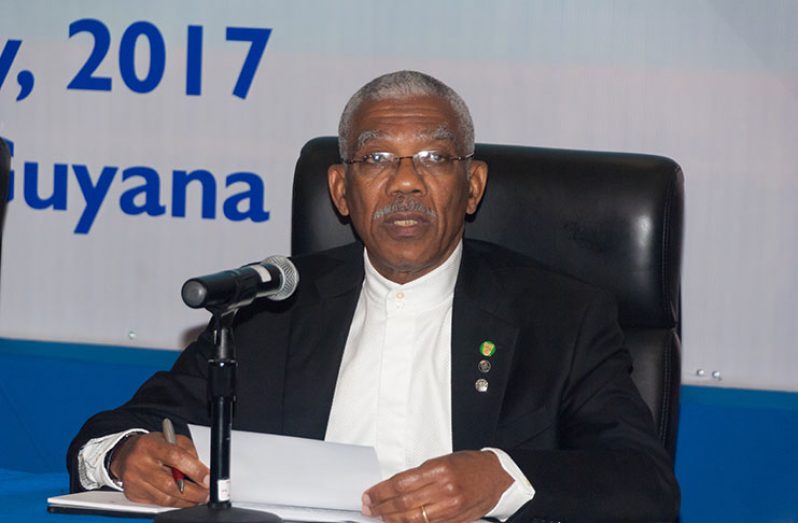HEADS of the Caribbean Community and Common Market (CARICOM) have committed to placing greater emphasis on the social determinants of crime in an attempt to curb what the regional bloc describes as “unacceptable levels of crime” in the Caribbean. This was according to Chairman of CARICOM, President David Granger, on Friday at a news conference, following the conclusion of the 28th Inter-sessional Meeting of the Conference of Heads of Government of CARICOM held here over the last two days.
According to President Granger, the “unacceptable levels of crime” in the Region engaged the attention of the 15 Heads of Government who participated in the meeting in Georgetown. He explained that a decision was taken to place more emphasis on the social determinants of crime, in an attempt to curb same.
“We have resolved to do more to curb the scourge, including placing greater focus on the social determinants of crime, especially among the youth.”
To support these efforts, he said that Attorneys-General (AGs) in the Region will take action to finalise agreements which are essential to the implementation of the Regional Crime and Security Agenda.
The chairman explained that the regional bloc will be seeking to take full advantage of opportunities for capacity-building to address existing and emerging threats, including those related to cyber-security and Cybercrime, Crime Prevention and Drug Demand Reduction.
The Caribbean Human Development Report (HDR): Human Development and the Shift to Better Citizen Security report commissioned by the United Nations Development Programme (UNDP) has found that high levels of violent crime are hindering development in the Caribbean.
The report reveals that 8.5 per cent of the global population resides in Latin America and the Caribbean and yet 27 per cent of the world’s murders take place in the Region. Countries such as Jamaica and Trinidad and Tobago continue to struggle with its crime situation, with the two countries recording 1,192 and 410 homicides respectively in 2015.
The UNDP report was critical of what it termed the hardline “Iron Fisted” policies of Caribbean countries to deal with crime, describing them as “short-sighted policies, which have proven ineffective and, at times, detrimental to the rule of law.”
Agreeing that adherence to the rule of law is one of the key ingredients in maintaining a relatively low crime rate, was Prime Minister of Barbados, Freundel Stuart, who committed to rendering assistance at a bilateral level to CARICOM states dealing with high crime rates.
Speaking to the media on Thursday evening following the conclusion of CARICOM’s meeting on day one, Stuart explained that Barbados has invested much time and effort in “ensuring that the rule of law and not the rule of fancy or passion prevails” in that country. The Barbados PM contended that his country has been fortunate in not having to deal with the challenge of consistently high crime rates.
He said that Barbados’s detection rate, when crimes have been committed, is very high, and the Royal Police Force of Barbados ensures that the perpetrators are brought to justice. Stuart added that when there are detection rates of 15-20 percent, that undermines confidence in the police force in that country. “We know all of our CARICOM countries have delays in our justice system and that is a mountain we are trying to climb, but it helps people considerably to know, that when crimes are committed, the Police Force can be trusted and that keeps faith alive in the country,” he said.
A recent study by the Inter-American Development Bank (IDB) estimates the direct annual cost of crime and violence in Latin America and the Caribbean at US$261 billion or 3.55 percent of GDP –- roughly what the Region invests on infrastructure and double the average cost for developed countries.
It is also the equivalent income for 30 percent of the poorest population, underscoring the grave development impact violence has on the Region. The Costs of Crime and Violence: New Evidence, New Revelations in Latin America and the Caribbean is a landmark effort to provide comparable crime costs numbers for 17 countries in the Region, benchmarking them against six developed countries.
Curbing crime -CARICOM Heads agree to do more to curb ‘unacceptable levels’ of crime
SHARE THIS ARTICLE :
Facebook
Twitter
WhatsApp




.png)









